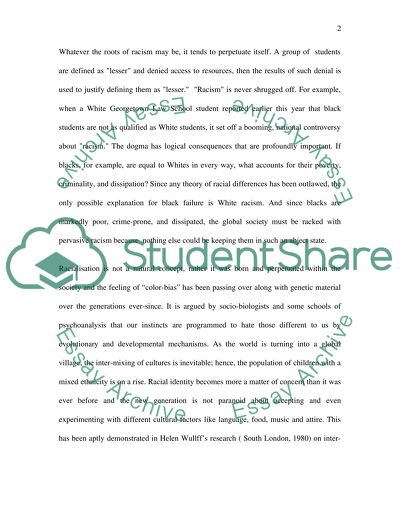
From Dismantling Racism: A Workbook for Social Change Groups, by Kenneth Jones and Tema Okun, ChangeWork, This is a list of characteristics of white supremacy culture which show up in our organizations. Culture is powerful precisely because it is so present and at the same time so very difficult to name or identify Race Consciousness. Critical Race Theory challenges widely held but erroneous beliefs that “race consciousness” is synonymous with “racism” and that “colorblindness” is synonymous with the absence of racism. 6 Colorblindness, which is both an attitude and a school of thought, posits that nonracial factors (e.g., income) fundamentally explain ostensibly racial phenomena political correctness, racism has taken on distinctly more subtle and aversive forms. People have begun to guard against the overt forms of racism frowned upon in a politically correct landscape (Deitch et al., ). Current research investigating discrimination within
Critical Race Theory, Race Equity, and Public Health: Toward Antiracism Praxis
Policy Points Racism is a fundamental cause of health inequities and disease, which requires policy solutions that address this cause directly rather than only targeting mechanisms. Cultural systems, such as cultural paper on racism, undergird the paper on racism conditions that shape racial inequities in health, including social and health policy decision making, governance, practice, and public reception.
Policies targeting racial health equity benefit from integrating social theory and meaningful assessments of the social context concerning race, paper on racism, racism, and health. Context: Improving the health of the total population may be insufficient in eliminating racial disparities in population health.
An expanding commitment to understanding social determinants of health aims to address the social conditions that produce racialized patterns in health inequity.
There is also a resurging and evolving interest in the influence of cultural barriers and paper on racism in shaping racial inequities in health. The meaning and function of culture, however, remains underspecified, paper on racism. Methods: This paper synthesizes analogous but fragmented concepts of cultural threat related to social and racial inequity as examined in public and population health, psychology, sociology, communications, media studies, and law, paper on racism.
It draws on an existing typology of culture and social inequity to organize concepts related to cultural racism. Employing a transdisciplinary approach, the paper on racism integrates multiple scholarly perspectives on cultural threat to frame cultural racism as cultural systems that promote false presumptions of white superiority relative to non-whites.
Findings: The lack of shared conceptual grounding and language regarding cultural threats to health hinders a more precise identification and measurement of cultural processes as well as comparisons of relative prevalence and influence of pathways linking cultural processes and social inequity. Evaluating intersections among culture, structures, and racism is a valuable analytical tool for understanding the production of social and racial inequities in health. To adequately address health inequities rooted in systemic racism, it is imperative to discuss the function of cultural racism in shaping population health in the United States.
Conclusions: Building a culture of health and achieving health equity requires that we assess cultural racism in a more meaningful way.
Cultural processes are commonly referenced in health inequity scholarship, but the empirical literature generally lags behind the conceptual emphasis. A rich literature across disciplines has substantively engaged conceptualizations of culture and cultural processes, the importance of these processes as part of a system of racism, and mechanisms that may link cultural threats to health.
When integrated, this literature offers essential insights for ways population health may address the complex issue of eradicating racial disparities in health. Keywords: culture; disparities; population health; racism. Abstract Policy Points Racism is a fundamental cause of health inequities and disease, which requires policy solutions that address this cause directly rather than only targeting mechanisms.
Race, Racism, Prejudice and Discrimination - What are they?
, time: 5:24Culture, Race, and Health: Implications for Racial Inequities and Population Health

Racism Thesis Statement Examples. Below are racism thesis statement examples on analytical, argumentative and expository topics. They should guide you in understanding the type of paper you’re writing, something which is essential if you intend to come up with an eye-catchy thesis From Dismantling Racism: A Workbook for Social Change Groups, by Kenneth Jones and Tema Okun, ChangeWork, This is a list of characteristics of white supremacy culture which show up in our organizations. Culture is powerful precisely because it is so present and at the same time so very difficult to name or identify Methods: This paper synthesizes analogous but fragmented concepts of cultural threat related to social and racial inequity as examined in public and population health, psychology, sociology, communications, media studies, and law. It draws on an existing typology of culture and social inequity to organize concepts related to cultural racism
No comments:
Post a Comment